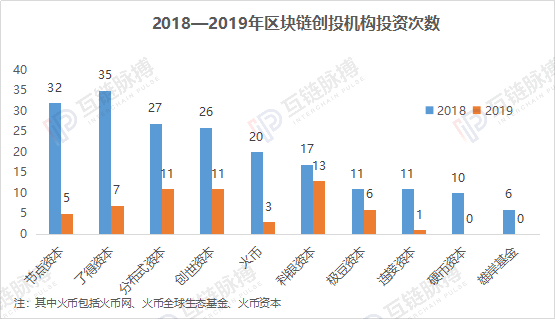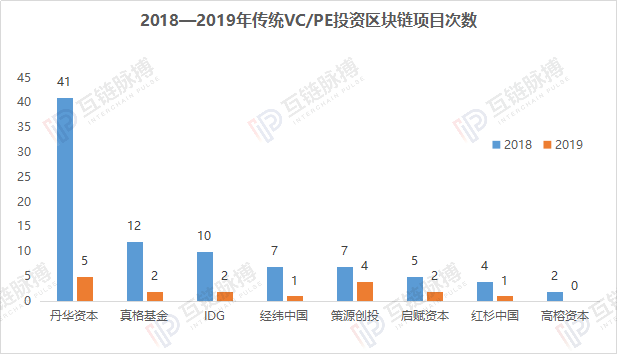The big brothers in the currency circle have shrunk the battlefield, and the popularity of traditional venture capital institutions has plummeted. How will the primary market of the blockchain play in the second half?
Text: Interchain Pulse · Liangshan Huarong
Over the past year, the enthusiasm of the primary market for blockchain investment has plummeted.
In 2018, Li Xiaolai, Xu Xiaoping, Xue Manzi, Du Jun, etc. were once the protagonists of the blockchain investment and financing market. Traditional venture capital institutions such as IDG, Jingwei China, Sequoia Capital, and Qifu Capital also accelerated their admission. .
But after a lapse of less than a year, these big names in the currency circle either cashed out or plunged into huge losses, the investment frequency dropped sharply, and traditional venture capital institutions were also more cautious. Blockchain investment projects were few in a year.
- Shanghai Blockchain Industry and Park Development Report: Yangpu District established the first 5 billion-scale blockchain industry guidance fund, which has a good foundation for industrial development
- Zhu Jiaming's New Work: Recognizing Future Currency Needs New Thought Resources
- KPMG report: China's fintech will enter the 2.0 era, and blockchain has been widely used in various fields of financial services
According to mutual chain pulse statistics, in 2019 the domestic blockchain industry disclosed a total of 166 investment and financing events, a year-on-year decrease of 52.4%, and total financing of 3.106 billion yuan, a year-on-year decrease of 82.04%.
How should the investment game in the primary market of the blockchain continue?
Token ring leaders shrink front, TokenFund usher in a dark moment
In the bull market, the big names in the blockchain industry are the protagonists of the blockbuster investment and financing market. After entering the bear market, they either cash out and disappear, or shrink the front, but it is still difficult to avoid falling into huge losses.
The big guys who faded out of the blockchain investment and financing market in 2019 had to mention Xu Xiaoping and Li Xiaolai.
Interchain Pulse According to public data statistics, Xu Xiaoping's Zhenge Fund invested 12 blockchain projects in 2018, but only 2 in 2019. And Li Xiaolai's coin capital invested in 10 blockchain projects in 2018. By 2019, he has basically not invested in any projects, and Xiongan Fund, which Li Xiaolai once served as a managing partner, announced in 2018 after investing in 12 projects. No more news.

Other big men who insist in the bear market are shrinking their fronts sharply, investing most of their funds in areas where money is fast and closer to transactions.
For example, Du Jun's node capital, according to public information, shows that it invested in 32 projects in 2018, covering public chains, mining machines, wallets, news, exchanges and other fields, but its publicly available in 2019. Of investment projects have been reduced to five, and the vast majority are exchanges.
Another leader of the currency circle, Elliott Capital, has as many as 35 investment projects in 2018, but only 7 investment projects in 2019, of which 5 are exchange projects.
The number of other investment institutions such as Xiao Feng's distributed capital, Zhu Huaiyang's Genesis Capital, and the "post-95s" Zhang Yiyun Jidou Capital also significantly reduced their investment projects in 2019, and mainly focused on exchanges and cryptocurrencies.
However, since November 2019, the regulatory authorities in many places across the country have strengthened the rectification of virtual currency trading venues, and a large number of exchanges have been retired or even closed down. This has led many blockchain investment institutions, especially the exchanges invested by TokenFund. The project was drifting.
In fact, the vast majority of current blockchain venture capital institutions are TokenFunds. Unlike traditional VC / PE, TokenFund pays more attention to cash flow and holds belief in the original assets of the blockchain, so it is mainly a currency-based investment. However, in a bear market, this kind of currency-based investment was affected by the sharp fluctuations in the currency price. At one time, many TokenFunds were eliminated directly. Even the node capital and the capital that were at the head suffered huge losses in the 2018 bear market. .
In the current environment of bear market cycle and stricter policy supervision, the living environment of TokenFund is becoming increasingly difficult.
Distributed capital partner Sun Ming recently pointed out that if the Token Fund simply invests in the primary market, it will be difficult to survive. "Token Fund is currently not active in the primary market, mainly due to the slump in the primary market. Many Token Funds have not actually disappeared, and may be more transformative, such as focusing on the development of the secondary market."

The heat of traditional venture capital institutions plummeted, and shots were more cautious
Compared with the shrinking front of the Token Fund, most traditional venture capital institutions tend to wait and see in the blockchain field in 2019.
For example, Jingwei China, Sequoia China, IDG Capital, Qifu Capital, etc. only invested 1-2 projects last year. The number of Danhua Capital's investment projects in the heavy storage blockchain industry in 2019 directly decreased from 41 in 2018 to 5 Each.
Unlike TokenFund, traditional venture capital institutions will pay more attention to policy supervision risks in 2019. Investment projects are mainly based on blockchain media, technology developers, privacy protection, etc. There are very few exchange and public chain projects, and mainly overseas star projects.
For example, a lot of strategy source venture capital shots. Of the 4 investment events in 2019, 3 were blockchain media, including Deepchain Finance and Mars Finance. In addition, Qifu Capital and Shunwei Capital also invested in blockchain. Information platform currency world.
In addition, Sequoia China and Jingwei China, which have few shots, only invested in blockchain technology R & D vocational technology and Warm Wah technology focusing on health insurance technology in 2019, while IDG Capital and Zhenge Fund invested in transactions. Sohu and the public chain, but are overseas projects, are Silicon Valley star public chain ThunderCore and Japanese exchange Quoine.
Compared to running and entering in 2018, the investment of traditional venture capital institutions in the blockchain field was more cautious and conservative last year.
In fact, the mutual chain pulse statistics found that in 2018, the fields invested by traditional venture capital institutions were mostly concentrated in the public chain, exchanges, mining and digital wallets, but as the bear market continued in 2019, coupled with stricter policy supervision In these areas related to cryptocurrencies, there are very few compliance projects left for traditional venture capital institutions.
In the field of blockchain technology R & D and application, most projects have not yet found a suitable profit model, and the investment return cycle is relatively long and the risks are large, which has caused traditional venture capital institutions to stall.
On the other hand, under the influence of multiple economic factors such as the Sino-U.S. Trade war in 2019, the capital winter has been covering the entire traditional venture capital circle. Not only is it difficult to raise funds for VC / PE, but even many parent funds are short of money. Investment institutions are very cautious in their investment attitudes, especially for higher-risk blockchain projects.
However, after the "1024 speech", the blockchain has ushered in a policy breeze, and a large number of listed companies have begun to get involved in the blockchain business. The promotion of industrial capital has undoubtedly opened a good situation. For traditional venture capital institutions, The blockchain industry is a promising circuit.
This article is the original [Interlink Pulse], please indicate the source when reprinted!
We will continue to update Blocking; if you have any questions or suggestions, please contact us!
Was this article helpful?
93 out of 132 found this helpful
Related articles
- Overview of the crypto asset industry in 2019: the rotation of the cycle and the dawn of dawn
- What would Soros do if he wanted to destroy Bitcoin?
- These 7 directions are expected to become "new air outlets"! “ Sichuan Province Blockchain Industry White Paper (2019) '' released
- Higashino Keigo and Zhang Xinzhe all "boarded"! Concert ticket data on the chain
- Liquidators: How to make a huge profit on DeFi
- Will the cash between Alipay and WeChat disappear due to the central bank's digital currency?
- Cryptocurrency money laundering analysis: how criminals will transfer billions of dollars in 2019





